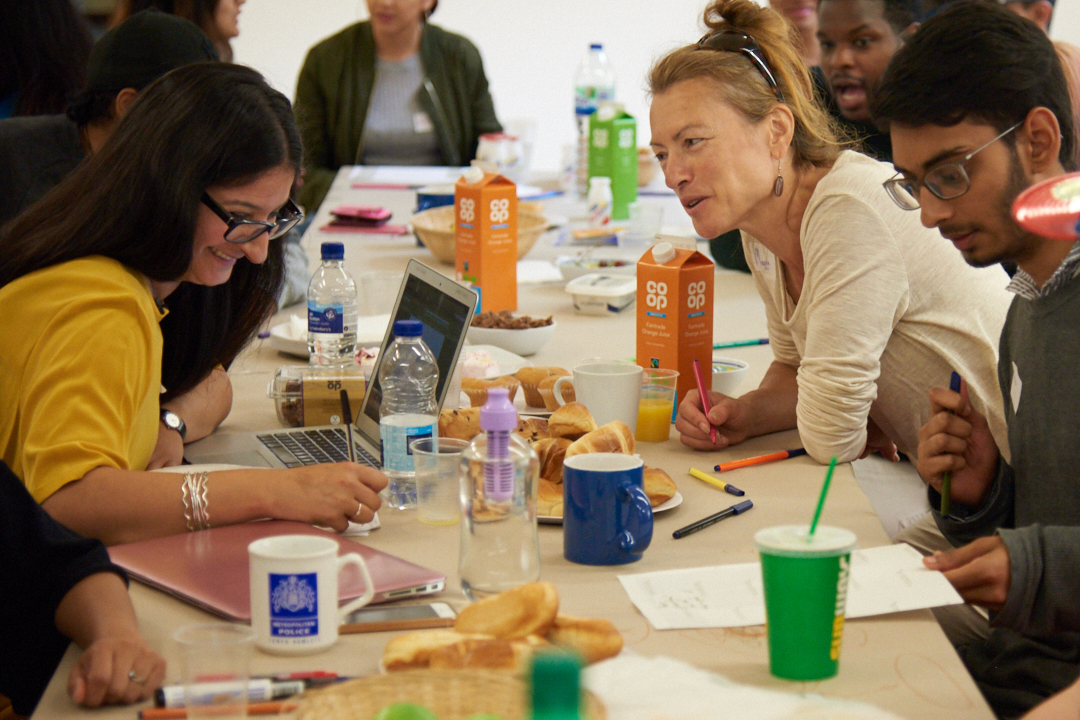By Dr Maggie Inchley
(Originally published at NNECL – National Network for Education of Care Leavers- in November 2020)
n 2015, lecturers at Queen Mary University of London (QMUL) found out that only 6% of young people leaving care were going to university. [i] They wanted to find out more about experiences of care and how universities might exclude, marginalise or stigmatise care leaver students and their experiences. They joined forces with arts organisation People’s Palace Projects to initiate The Verbatim Formula (TVF).
Since then TVF has worked with QMUL, Greenwich, Goldsmiths, the University of East London, and the Royal Central School of Speech and Drama, as well as partners in Scotland, using performance to help support care-experienced young people plan for their futures, and let universities know of their needs. We aim to welcome care-experienced young people onto university campuses, and hope to make them feel an equal part of the spaces around them.
TVF puts listening at the centre of its research process. We asked young people about the role that listening played in their experiences of care. We were often told that in spite of their right to be heard, young people felt that their experiences and wishes were being disregarded. One teenager, Leah, testified:[ii]
‘I’ve literally become a catalogue of statistics, and just irrelevant facts and info. And it’s dehumanizing to be honest. If adults don’t really view you as a human then how can you view yourself?… Right now, according to the system, kids have become just another number, another statistic, and it’s not whether a child is being cared for, it’s whether they’re being dealt with.’
Leah was talking about her experience of care. But universities should listen better too.
Performing Listening
With our young co-researchers, we make verbatim recordings, edit them down, and load then up on i-pods. By listening very carefully to the recordings through headphones, the words are performed for audiences simply by speaking aloud what the performer is hearing.
 Performing the recorded testimony feels like ‘becoming’ another human being through the sounds and rhythms of their voice, including the gaps in their words, their hesitations, mistakes, laughs, sighs and groans. Performed anonymously, the words of young people and adult professionals can be shared and discussed without a sense of judgement or blame.
Performing the recorded testimony feels like ‘becoming’ another human being through the sounds and rhythms of their voice, including the gaps in their words, their hesitations, mistakes, laughs, sighs and groans. Performed anonymously, the words of young people and adult professionals can be shared and discussed without a sense of judgement or blame.
Care-experienced young people have skills and knowledge about how they are marginalised or excluded from places and scenes of power. Too often care leavers are made to feel like ‘trespassers’, who bring voices and testimonies into spaces where they are rarely heard.[iii] In the photo above TVF facilitator Shona is getting ready to speak the interviewee’s words in real-time; re-staging the tonality, affect and rhythm of the testimony about the dehumanising effects of care on young people’s capacities to thrive and to make the transition to university effectively.
The photograph was taken during an event hosted by TVF that marked the launch of the project’s Making Places (2018) guide. This is a handbook for university workers written by the TVF research team. In addition to giving guidance on inviting young people with experience of living in state care onto campus, Making Places provides a methodology that includes these young people in practice research techniques to create alternative evaluations of university services. In contrast to the reporting and statistical analysis commonly deployed to measure and assess university ‘performance’, TVF’s approach is artistically performative, staging space and time for meaningful dialogue amongst all who are present.
 When the verbatim testimonies have been performed to adult audiences they have made a big impact. Staff have told us that they had little knowledge of foster care, and how care leavers often had specific needs and challenges. One audience member told us, ‘it makes you really listen… it makes you take a step back from what you’re expecting to hear… I think I listened with a more open ear’.
When the verbatim testimonies have been performed to adult audiences they have made a big impact. Staff have told us that they had little knowledge of foster care, and how care leavers often had specific needs and challenges. One audience member told us, ‘it makes you really listen… it makes you take a step back from what you’re expecting to hear… I think I listened with a more open ear’.
You can download the Making Places guide and find out more about TVF at: http://www.theverbatimformula.org.uk/
If you would like our advice or want to find out about working with or commissioning TVF, please do get in touch with us, at [email protected].
TVF is led by Dr Maggie Inchley (Senior Lecturer in Drama, Theatre and Performance, Queen Mary University of London), and Dr Sylvan Baker (Lecturer in Applied Performance, Royal Central School of Speech and Drama), with the support of People’s Palace Projects.
————————————————————–
[1] Neil Harrison’s later research for NNECL in 2017, which took into account later entrants, found that 11.8% of care leavers entered HE. Neil Harrison, Moving On Up: Pathways of Care Leavers and Care-experienced Students into and Through Higher Education (Bristol: University of the West of England, 2017).
[1] [1] All names have been changed to protect and respect the identities of the original speakers.
[1] Nirmal Puwar, Space Invaders: Race, Gender and Bodies Out of Place (Oxford: Berg, 2009), p.8.



